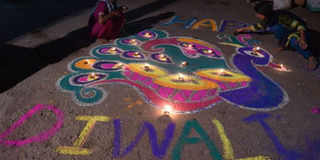Diwali is more than a festival of lights

Pakistani minority Hindus celebrate Diwali in Karachi on November 11, 2015. Diwali, the festival of lights, is celebrated with jubilation and enhusiasm as one of the biggest Hindu festivals. PHOTO | AFP
What you need to know:
- Gambling on the night of Diwali is essentially a very subtle adherence to a sacred belief. It is associated with a legend where the Goddess Parvathi played dice with her husband the Lord Shiva and decreed that whosoever gambles on the night of Diwali would prosper in the following year.
- At home, a wife worships Goddess Lakshmi and adorns her husband’s forehead with a Red Tilak. She also prays for his long and healthy life. In appreciation, the husband gives the wife a costly gift called “Gudi Padwa” which symbolises love and devotion.
Hindus celebrated Diwali, the festive of light, this past week. Faithful offered prayers to celebrate the victory of light over darkness, exchanged gifts, lit lamps to ward off evil and welcome blessings, and made merry by bursting fire crackers. There are other significant traditions that make this festival.
Gambling on the night of Diwali is essentially a very subtle adherence to a sacred belief. It is associated with a legend where the Goddess Parvathi played dice with her husband the Lord Shiva and decreed that whosoever gambles on the night of Diwali would prosper in the following year. Diwali, as we know, is associated with wealth and prosperity in many more ways than gambling. Thus Dhan Teras is observed a couple of days before the festival of lights. Dhan means wealth and Teras 13th.
At home, a wife worships Goddess Lakshmi and adorns her husband’s forehead with a Red Tilak. She also prays for his long and healthy life. In appreciation, the husband gives the wife a costly gift called “Gudi Padwa” which symbolises love and devotion.
In another ritual, faithful take a special bath before sunrise with oil and uptan — a paste of gram flour to ward off evil and welcome blessings. Doors are decorated with motifs drawn with powder colours to welcome Lakshami the heavenly forbearer of wealth and prosperity. Small foot prints are drawn with rice flour and vermillion powder in the house and lamps kept burning all night. Women of the household purchase some gold or silver or at least one or two utensils to usher in happiness and prosperity.
Govardan Pooja is the special prayer faithful recite. Deities are given a milk bath and dressed in shiny attires and expensive ornaments before the prayer session commences. After the prayers, faithful offer sweets and food to the deities.
The rituals and traditional aspects are many and varied. However, the prime motive behind them is an earnest wish of the faithful to seek heavenly blessings for peace and prosperity. May good always triumph over evil and the forces of peace, love, unity and prosperity be showered over our land




